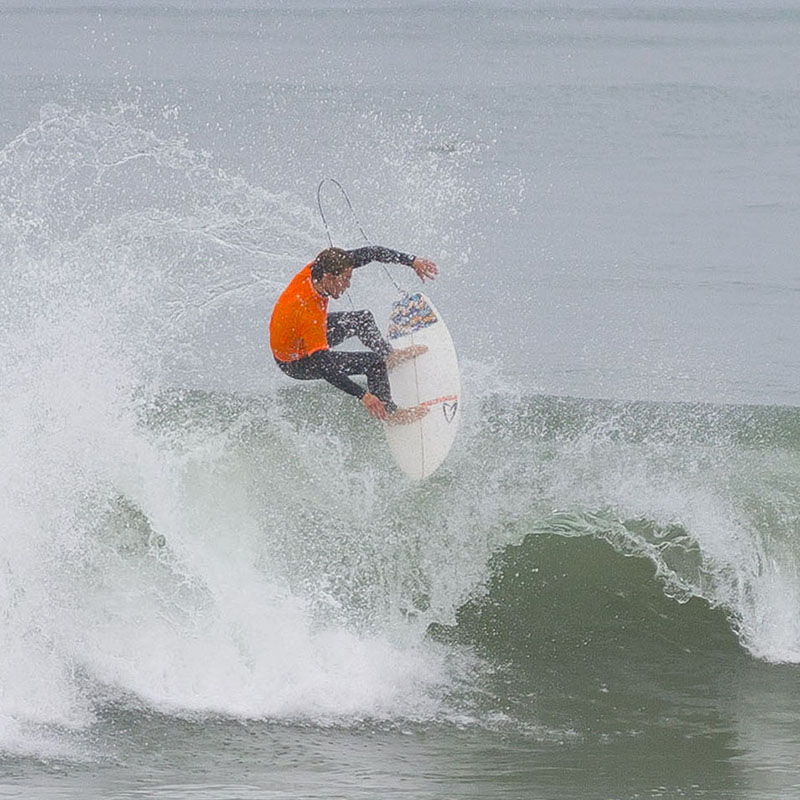CAMARILLO — Will surf for science. If that describes you, CSU Channel Islands (CSUCI) has just the project for you and your surfboard (bodysurfers also welcome).
“Surfers are not only on the front lines of coastal change, but our data show that they can be incredibly reliable citizen scientists because in order to surf, they must learn to make such careful observations of the ocean,” said Reineman, a surfer for the last 30 years. “Surfers will be the first to notice impacts to our coasts that eventually will affect the rest of us. We can generate data from their wave knowledge that will help us determine what we can do as coastal communities to address and adapt to changing oceans and coasts.”
Surfrider Foundation Southern California Regional Manager Bill Hickman rode waves at Surfers’ Point during the king tides on Jan. 10.
“During the king tide much of Surfers’ Point was unsurfable,” Hickman said. “Waves that made it inside the cove had to compete with the backwash of waves bouncing off the rocks. It was interesting to note that the best waves were at the managed retreat area near the river mouth where the bike path was moved back and replaced with dunes.”
Hickman added that surfing is important to many people in Ventura County and is a significant contributor to the local economy so Surfrider is concerned with protecting Surfers’ Point and other surf spots in Ventura County.
 Assistant ESRM Professor Kiki Patsch, Ph.D., a coastal expert, is also involved in the project, visiting various surfing spots in Ventura County and taking photos of the king tides to help her research on coastal resilience and sea level rise.
Assistant ESRM Professor Kiki Patsch, Ph.D., a coastal expert, is also involved in the project, visiting various surfing spots in Ventura County and taking photos of the king tides to help her research on coastal resilience and sea level rise.
“The areas that start to see coastal flooding during the king tides are the areas that will feel the effects of sea level rise first,” Patsch said. “Talking about a foot or two of sea level rise in the next 20 years is one thing, but to show pictures of it really helps communicate what could be big problems in the not too distant future.”
Reineman is looking at the effects of sea level rise on waves, whereas Patsch is concentrating on sand management, planning, development, and beaches. Both are considering the effect sea level rise will have on beach access.
Reineman is careful to clarify that they are not technically asking anybody to surf, but if you already are planning to surf during the King Tides, then Reineman and the students at the helm of the project would like to hear about what you observe in the water.
Leading the research as their senior “Capstone Thesis Project” are ESRM majors Ashlee Phelps and Ryan O’Sullivan.
“We are asking surfers what time they went in the water, what time they got out, the quality of the waves while they were surfing and at any point did they notice that the waves were particularly good or bad,” Phelps said.
“We ask surfers to note any significant changes, which may be where the wave breaks, how the wave breaks or how frequently waves break,” said O’Sullivan, who is a surfer himself. “Surfers are essentially wave experts. And can generally detect differences based on ever changing conditions.”
Phelps added that non-surfers can research from the shore, too.
“We thought it would be good to have someone with surfing experience and someone without in order to bring in multiple perspectives,” Phelps said.
If you would like to be a citizen research surfer, or a citizen scientist observing from the beach, visit: www.coastography.org/kingtides.
Additional information about Kiki Patsch’s research can be found at: www.sandshed.org.
About California State University Channel Islands: CSU Channel Islands (CSUCI) is reimagining higher education for a new generation and era. We are an innovative higher education institution that enables students to succeed and thrive – serving as an engine for social and economic vitality that provides the intellectual resources necessary for a thriving democracy. With more than 7,000 students, 1,200 employees and 14,000 alumni, CSUCI is poised to grow in size and distinction, while maintaining one of the most student-focused learning environments in public higher education. Connect with and learn more by visiting www.csuci.edu or CSUCI’s Social Media.

